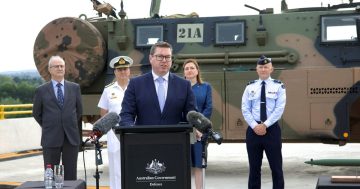
The audit report found Defence was not adhering to the 2019 Defence Policy for Industry Participation framework, designed to improve the involvement of Australian industry in Defence contracts. Photo: ADF.
The Department of Defence has been found to not be meeting its contractual obligations to maximise the use of Australian industry where possible.
The Maximising Australian Industry Participation through Defence Contracting report by the Australian National Audit Office (ANAO) says in 2022-23, Defence ranked as the Australian Government’s largest procurer, spending 51.7 per cent of Commonwealth entity contracting, valued at $38.69 billion.
Despite these numbers, which are forecast to top $50 billion this year, the ANAO found that Defence has not been effectively monitoring or ensuring the delivery of its industry policy and contracting requirement obligations.
It says in March 2019, then-Minister for Defence Industry Christopher Pyne released the Defence Policy for Industry Participation (DPIP) plan in a bid to improve consistency in Defence’s approach to maximising Australian industry’s opportunity to participate in Defence procurement.
The DPIP requires Defence to consider Australian Industry Capability (AIC) plans or schedules, and to ensure the industry commitments in those plans are captured as contracted obligations if valued at more than $4 million.
The audit’s objectives and criteria were to examine the effectiveness of Defence’s administration of contractual obligations to maximise Australian industry participation.
To form a conclusion against the audit objective, the review asked whether fit-for-purpose administrative arrangements have been established to maximise Australian industry participation, whether applicable contracting requirements have been implemented to maximise Australian industry participation, and whether Defence has implemented appropriate governance, assurance and reporting arrangements to support the objectives.
In summary, Defence was found to have not maximised Australian industry participation through the administration of its contracts.
“Defence’s administrative arrangements for maximising Australian industry participation through its procurement and contracting activities are partly fit for purpose,” it says.
“Defence’s procurement framework has not been updated in a timely manner and, as at August 2024, did not fully reflect the requirements of the March 2019 DPIP.
“Guidance for Defence personnel in relevant tendering and contracting templates is incomplete, and in some cases outdated.
“Defence has not implemented applicable contracting requirements effectively,” it added, saying that of the eight contracts the audit report examined, each had at least one shortcoming resulting from limitations in Defence’s advice to potential suppliers, weaknesses in Defence’s contracting of industry participation commitments, and ineffective monitoring of supplier compliance with those commitments.
As a result of its findings, the ANAO made nine recommendations, all of which Defence has agreed to.
These include that Defence moves to ensure its contract template and guidance documents are up to date and aligned with Defence industry contracting and policy requirements.
It further recommends that it implements controls for its procurement, financial, and contract management activities to support and monitor compliance with these obligations, that procurement and contract management training is implemented, and that senior leadership is informed of the extent to which role-specific training has been completed.
It also said the scope of the existing AIC Practitioners course needs to be extended, that public AIC plans should be prepared and published where required, and that Defence improves its oversight arrangements to monitor and drive appropriate consistency in its implementation of industry policy.
In response, Defence said it was “committed to ensuring that Australian industry participation in Defence contracts is considered and optimised in the delivery of Defence capabilities”.
“Defence accepts the key findings and recommendations aimed at enhancing governance, assurance, reporting arrangements, relevant training and guidance when implementing Australian industry participation policy requirements in Defence procurements.”











